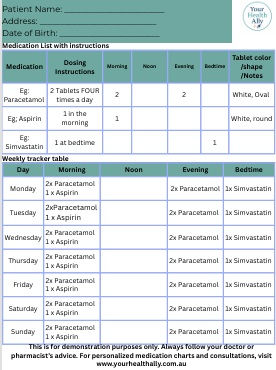Personal Leave in Australia: Your Rights and How Pharmacists Can Help
- Your Health Ally
- Aug 14
- 2 min read
Taking time off work when you’re unwell is important for recovery and safety. In Australia, employees are entitled to personal leave (often called sick leave) to manage their own illness or care for an immediate family member.

How Personal Leave Works
Full-time and part-time employees generally accrue 10 days of paid personal leave per year. Casual employees usually do not receive paid personal leave.
Personal leave can be used when you are unwell or need to care for someone in your household or immediate family who is unwell.
Providing Evidence
Employers may request documentation to support personal leave. Acceptable evidence can include:
A medical certificate from a registered health professional, such as a doctor.
In some cases, a pharmacist may provide an Absence from work certificate for minor conditions, depending on the service scope and regulatory guidelines.
Medical Certificate vs Pharmacist Certificate
Medical Certificate
Issued by a doctor or other authorised health practitioner.
Can cover a wide range of health conditions, including more serious or ongoing issues.
May be required for certain workplace or insurance policies.
Pharmacist Absence from Work Certificate
Issued by a registered pharmacist for minor ailments or for caring for someone with a minor ailment.
Usually covers short periods (e.g. 1–2 days).
Not suitable for more serious illnesses or long-term leave.
Cannot be issued for compassionate leave.
Cannot be issued for pregnancy-related conditions.
How a Pharmacist Can Support You
Pharmacists are accessible health professionals who can provide guidance for minor health concerns and support your recovery:
Minor physical ailments
Conditions like colds, flu, headaches, or mild stomach upset.
Pharmacists can assess whether symptoms are likely minor or if further medical care is needed.
In certain situations, pharmacists can issue a sick certificate for work if the condition is within their regulated scope.
Mental health and wellbeing support
Pharmacists can provide general advice on stress, mild anxiety, or sleep difficulties.
They can refer you to a doctor, psychologist, or other mental health professional when necessary.
Pharmacists cannot diagnose or treat serious mental health conditions, but they can guide you to appropriate care and provide documentation for short absences related to wellbeing where permitted.
Medication and safety guidance
Advice on safe use of over-the-counter medicines while unwell.
Checking for drug interactions or allergies if you are taking prescription or OTC medications.
Practical Tips for Taking Personal Leave
Notify your employer promptly if you need to take personal leave.
Provide documentation if requested.
Follow advice from qualified health professionals to support recovery.
This information is provided for general educational purposes only. It does not replace individualized advice from your doctor, pharmacist, or other health professional.




Comments